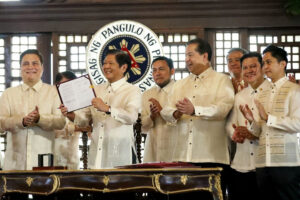Marcos signs Maharlika bill into law

By Kyle Aristophere T. Atienza, Reporter
PRESIDENT Ferdinand R. Marcos, Jr. on Tuesday signed into law a measure creating the Philippines’ first sovereign wealth fund, despite concerns raised by economists over its financing and management.
“The establishment of a sovereign wealth fund will widen the government’s fiscal space and ease pressure in financing public infrastructure projects,” he said in a speech at the signing of Republic Act No. 11954 or the Maharlika Investment Fund (MIF) law in Malacañang.
Through the P500-billion ($9.19 billion) fund, Mr. Marcos said the government will be able to accelerate the implementation of 194 flagship projects approved by the National Economic and Development Authority (NEDA)Board.
Mr. Marcos and his economic managers have been pitching the wealth fund during his foreign trips, including at the World Economic Forum in Davos, Switzerland in January.
Malacañang has yet to release a copy of the newly signed law, but based on the information released by the Presidential Communications Office, the sovereign wealth fund will issue P500 billion worth of preferred and common shares that can be bought by the National Government (NG), state-run corporations and financial institutions.
The P125 billion in initial funding will also be taken from the NG’s share in the Philippine Amusement and Gaming Corp. (PAGCOR) and other government-owned gaming operators’ and regulators’ income, privatization proceeds and transfer of assets, and other sources such as royalties and special assessments, the palace said.
“Nothing much has changed from the initial draft to the final version,” former Bangko Sentral ng Pilipinas (BSP) Deputy Governor Diwa C. Guinigundo said in a Viber message, noting that the law does not address the issues of the country’s “lack of surplus funds, the trade-off between budgetary allocations for infrastructure, health, education etc., and diversion to investment via MIF.”
Mr. Guinigundo also cited issues related to governance and the “abdication by Congress of its power over the purse.”
He lamented that the law “represents an act” undermining the independence of the BSP, since it will be required to contribute its total declared dividends.
“The BSP recapitalization will be postponed for the next two years in favor of the MIF,” he said, adding it would now take 17 years instead of eight years to recapitalize the central bank. “At this time of global uncertainty and volatility, the monetary authorities should be strengthened unequivocally rather than weakened.”
Mr. Guinigundo had said that to replenish public money that will be used for the Maharlika fund, the government would be forced to either increase taxes or borrow money domestically or abroad — or do both.
In a statement, Taumbayan Ayaw sa Maharlika Fund Network Alliance raised fears the MIF would reduce available public funds for social services such as healthcare, housing and education.
“Almost all known groups of economists in the country — representing all colors of the political spectrum — also oppose the passage of the MIF bill, as there are not enough safeguards in the bill to ensure that the people’s money would yield profits and/or that public funds won’t be plundered or used to favor certain corporations,” the coalition said.
In a statement, NEDA Secretary Arsenio M. Balisacan said there are strategic areas in the energy sector that the government wants the MIF to invest in.
“There are many areas that are in great need of capital, so we will never run out of investment opportunities,” he said.
The MIF will also be an alternative to debt financing when the country becomes an upper middle-income country and would no longer qualify for concessionary loans such as official development assistance, Mr. Balisacan said.
The Philippines is classified as a lower middle-income economy by the World Bank, but the government is targeting to reach upper middle-income status by 2025.
NOT POLITICIZEDIn his speech, Mr. Marcos said the Maharlika Investment Corp. (MIC), which will manage and control the sovereign wealth fund, will be run by professionals and will not be politicized.
“Let us make sure that the decisions that are being made for the fund are not political decisions [but] are financial decisions because that is what the fund is,” he said. “It is essentially a fund that we will continue to invest in, and the fund will fail if we do not make money on the fund. It’s that simple.”
Based on the Palace document, the MIC will have a board of directors composed of nine members, including the Finance secretary.
However, Mr. Marcos said in his speech that the Finance chief, as well as the incumbent President, should not be part of the MIC’s board, saying that “if you put me or the secretary of Finance in a decision-making loop, those decisions will be colored by political considerations.”
“That must not be the case,” he said. “Structurally, we removed the political decisions from the fund, and those political decisions are left with the bureaucracy, the political bureaucracy, and the fund is left to be a fund and operating on a sound and proactive financial basis.”
In a statement, Finance Secretary Benjamin E. Diokno clarified that the President was just “stating his preference that the sovereign investment fund should not be headed by him or his Finance secretary.”
“Even at the early stage of the formulation of the sovereign investment fund, the President was clear: he didn’t want to politicize the Fund,” he said.
Nevertheless, the Secretary of Finance will only serve in an ex officio capacity and will not run the MIF, he said. “The Independent Chairperson of the 9-member Maharlika Investment Corp., a non-politician, will manage the Fund.”
The MIC will be guided by an advisory body composed of secretaries of the Department of Budget and Management, NEDA, and the National Treasurer on investment and risk management, according to the palace document.
The MIC, which will be required to adhere to the Santiago principles and other internationally accepted standards of transparency, is mandated to adopt relevant and stringent financial reporting and audit systems and will be subject to strict examination and audit by an Audit Committee, Internal Auditor and External Auditor, and the Commission on Audit.
“The law provides for heavy fines ranging from P1 million to P15 million, and imprisonment term from 6 to 20 years for various offenses, such as willfully holding office while in possession of any disqualification, knowingly certifying the corporation’s financial statements despite its gross incompetencies or inaccuracy, willing allowing oneself to be used for fraud, failure to sanction, report or file appropriate action for graft and corrupt practices, among others,” the palace said.
Senate President Juan Miguel F. Zubiri told reporters after the signing event that the implementing rules and regulations (IRR) for the law will likely be finished within the year.
The MIC is expected to be fully operational by end-2024.




